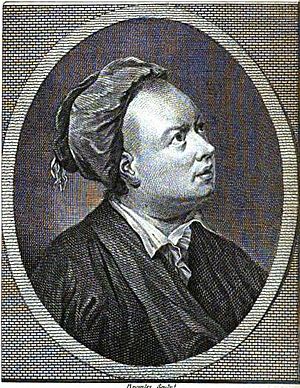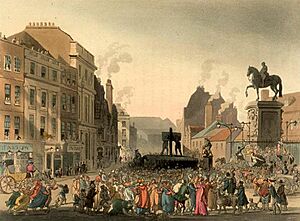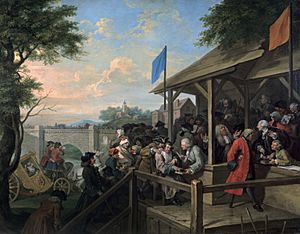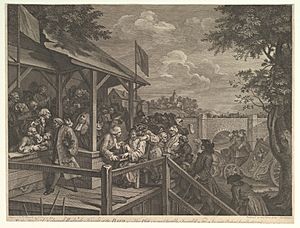John Shebbeare facts for kids
Quick facts for kids
John Shebbeare
|
|
|---|---|
 |
|
| Born | 1709 Bideford, Devonshire, England |
| Died | 1 August 1788 Pimlico, London, England |
| Occupation | Writer |
| Nationality | British |
| Genre | Political satire |
| Spouse | Susanna |
John Shebbeare (1709–1788) was a British writer known for his strong political opinions. He was a Tory, which was a political group that often supported the King and traditional ways. Shebbeare used his writing, especially satire, to make fun of and criticize the government and powerful people of his time.
Contents
The Life of John Shebbeare
Early Years and Medical Start
John Shebbeare was born in 1709 in Bideford, England. His father was a lawyer and a corn merchant. The Shebbeare family actually owned land in a village in Devon that shares their name!
John went to school in Exeter. People said he showed early signs of being a bit grumpy but also very smart. When he was 16, he started training to be a surgeon. Later, he opened his own practice. However, he got into trouble for writing critical things about his boss and the local government in Exeter.
Because of this, he moved to Bristol in 1736. There, he worked with a chemist. In 1740, he published a book about the waters in Bristol and how they could help with certain illnesses.
Becoming a Political Writer
In 1752, Shebbeare traveled to Paris. He claimed he earned a medical degree there and became a member of the Academy of Sciences. But he soon found that writing was a better way to earn money than practicing medicine.
He moved to London and began his career as a political writer in 1754. His first important work was a novel called The Marriage Act. This book criticized a new law about marriage. Because of his strong opinions in the book, he was put in prison for a short time.
In 1756, he wrote another famous work called Letters on the English Nation. He pretended that a Jesuit (a type of priest) living in London had written these letters, and he was just translating them. This book was a political satire that strongly criticized the government, especially the Duke of Newcastle.
Shebbeare also wrote for newspapers like the Monitor and the Con-test. He also published a series of very direct pamphlets called Letters to the People of England. People said he was determined to either get a good job from the government or end up in the pillory (a device used for public punishment).
The Pillory Incident
In late 1757, John Shebbeare published his sixth Letter to the People of England. In this letter, he argued that France's power and England's problems were due to the influence of Hanover (a German region connected to the British King).
Because of this, the government issued a special order to arrest him, his printer, and his publisher in January 1758. All copies of his seventh Letter were taken away and stopped from being published.
On June 17, Shebbeare was put on trial for writing something that was considered harmful to the government. The lawyer for the government, Charles Pratt, actually agreed that the jury had the right to decide on the law itself, not just the facts. During the trial, the judge said that criticizing dead kings was also a crime. He also said Shebbeare's letter was very close to a serious crime against the country.
On November 28, Shebbeare was sentenced to pay a fine, spend three years in prison, and promise to behave well for seven years after his release. He was also ordered to stand in the pillory at Charing Cross on December 5.
However, a kind official helped him. Shebbeare was allowed to stand comfortably in the pillory, and someone even held an umbrella over his head! After an hour, he left to cheers from the crowd, who had been invited to see "the British champion." The official who helped him was later punished for his actions.
Later Life and Royal Pension
While in prison, Shebbeare started collecting money for a history of England, but he never published it. After he was released, he supported making peace with France and criticized another famous political writer, John Wilkes.
In 1764, several members of parliament asked the government to help Shebbeare. He was then given a pension of £200 a year from the King. This meant he received money regularly from the government. From then on, Shebbeare became a strong supporter of the King and his policies. He even started criticizing his old favorite, William Pitt.
His most detailed work was The History of the Excellence and Decline of the Institutions... of the Sumatrans (1763). This book cleverly pointed out the weaknesses of the government's policies and then praised King George III and his ministers.
In 1770, Shebbeare published an Eighth Letter to the People of England. He also defended King George III's policies towards America against other writers.
John Shebbeare and another writer, Samuel Johnson, were often linked together in jokes because both received pensions from the King. People joked that the King had given money to a "He-bear" (Johnson) and a "She-bear" (Shebbeare).
The poet William Mason wrote a harsh poem about Shebbeare, saying he was "The same abusive, base, abandoned thing / When pilloried or pensioned by a king." Even his political friends sometimes made fun of him for changing from a critic to a supporter of the King.
The famous artist William Hogarth included Shebbeare in his painting The Polling, which is part of a series about elections. In the painting, Shebbeare is shown with a shackle on his leg, whispering to a man. In a later print version, he even has a copy of his Sixth Letter in his pocket.
A writer named Frances Burney met Shebbeare in 1774. She wrote that his conversation was often very rude. He especially disliked women and Scottish people, saying they were "the two greatest evils upon earth."
Death
John Shebbeare's last published work was in 1788. He died on August 1, 1788, in London.
Family Life
John Shebbeare married young, but it was not a happy marriage. He once said that he had been married for 41 years and had wished his wife "underground any time since." His wife, Susanna, also from Bideford, died in 1779. They had three children. One of their sons, also named John, became a church leader and died in 1794.
Some old documents spell his last name as "Shebear" or "Shebbear."
Notable Writings
Shebbeare's writings were usually strong and well-researched. While they could be very critical, they were not much harsher than other political writings of his time. Even his critics admitted that his writing had "force."
Besides the works already mentioned, some of his other writings include:
- Lydia, or Filial Piety: a novel (1755)
- Authentic Narrative of the Oppressions of the Islanders of Jersey (1771) - This book discussed problems faced by people living on the island of Jersey.
- Answer to the Printed Speech of Edmund Burke, esq. (1775) - This was a response to a speech by another famous politician and writer, Edmund Burke.
He also wrote some medical books, such as:
- Candid Enquiry into the Merits of Dr. Cadogan's Dissertation on the Gout (1772) - This book looked into a doctor's ideas about the illness called gout.
Overall, John Shebbeare wrote about 35 different pieces.
 | Delilah Pierce |
 | Gordon Parks |
 | Augusta Savage |
 | Charles Ethan Porter |




